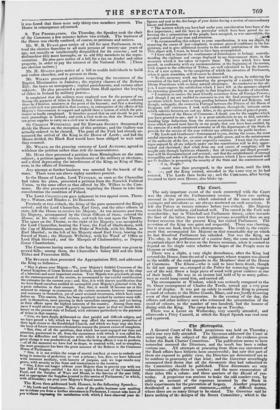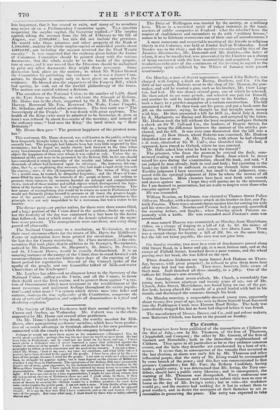int lactrapalfit1.
A General Court of the Bank proprietors was held on Thursday; and it was very fully attended. The Governor addressed the Court at some length on the subject of the publication of the evidence given before the Bank Charter Committee. The publication seems to have somewhat annoyed the Directors, and the result has been a rather curious one. All attempts at procuring from them any statement of the Bank affairs have hitherto been unsuccessful; but now that part of them are exposed to public view, the Directors are determined not to be outdone in generosity of that kind ; and the Governor accordingly announced their desire that all the documents they had submitted to the Committee should be published. These documents are very voluminous—eighty-three in number; and the mere enumeration of their titles fills a column and three quarters of the Herald of yes- terday. A proprietor was anxious to make the odd number even, by adding an account of the expenses incurred by the Bank in their experiments for the prevention of forgery. Another proprietor desiderated a short general statement,—rather a difficult matter, where there are so many things to be stated. The Governor said he knew nothing of the designs of the Secret Committee ; which is the less important, that it has ceased to exist, and -many of its members may. never sit on a Parliamentary Committee again. To a -question- respecting the surplus capital, the GoVernor replied—" The surplus eapital„ taking the account from the 9th of February to the 7th of August, was 2,900,000/. ; but this did not include the premises. He would take those premises and other property of the Bank at 1,100,000L, making the whole surplus capital or undivided profits about 4,000,000L, not including the amount received for the Dead Weight annuity." It was suggested that the evidence given before the House of Commons Committee should he printed along with the various documents, that the whole might be in the hands of the proprie tors at once; and it was moved that the Directors should be authorized to print any other documents they might deem neeessary. Some discussion took place on the motion ; in which !Mr. Winter blamed the Committee for publishing the evidence : as it was a Secret Com- mittee, he thought it ought only to have given an opinion on the evidence. He blamed also the supporters of the Forgery Bill; which bad sprung, he said, out of the morbid philanthropy of the times. The motion was carried without a division.
The members of the National Union, to the number of 1,500, dined at the Eyre Aims on Monday, to celebrate the triumph of Reform. Mr. Hume was in the chair, supported by Sir .T. M. Doyle, Mr. W. Harvey, Reverend Mr. Fox, Reverend ]Dr. Wade, Count Czapski, Dr. Schultze, and several other gentlemen. The first toast was " The Sovereignty of the People." It was drunk with great applause. The health of the King (who must be admitted to be Sovereign de facto at least) was refused by about five-sixths of the meeting; and instead of the ordinary tune, " God save the King," the band struck up " Rule Britannia !"
Mr. Hume then gave " The greatest happiness of the greatest num- ber."
This sentiment, Mr. Hume observed, was well known to the public, as having been frequently brought hefore it by one of the best of men, whom we had bitt _recently lost. This principle had hitherto been but very little respected by Go- .vernments ; but he hoped we might shortly look forward to the time when .every Government that existed, or that should be established, should have for its object the happiness of those over whom it was called to rule. Unless the at- tainment of this end were to be promoted by the Reform Bill, he for one should have considered it utterly unworthy of the trouble and labour which he and thousands of others had -bestowed upon its advocacy. . He, however, did con- sider, that. by ae:!miplishing that measure, they had made a rapid stride towards the -consco... ;ale-1 of this all-important principle. The terms of Whig and To y would soon, he trusted, be altogether forgotten ; and the House of Com- mons filled by Men having the interests of the people at heart, and seeking to promote those interests by measures founded on enlarged and comprehensive views, instead of those sinister and selfish objects which distinguished the legis- lation of the faction whom we had at length succeeded in overthrowing. The best means of accomplishing this would be to return no man to Parliament who
• would not diitinctry pledge himself to promote at all times the greatest happi- ness of the greatest number ; and every man who acted in opposition to this principle was not only unqualified to be a statesman, but was a traitor to his country.
The dinner party—or parties rather, for there were three rooms filled, and a large portion of the Union dined in the garden—broke up early ; but the festivity of the day was continued to a late hour by the dance that followed, and at which many of the female relatives of the mein- hers were present. The arrangements were excellent, and every thing passed off pleasantly.
The National Union came to a resolution, on Wednesday, to use itheir most strenuous efforts for the return of Mr. Hume for Middlesex. Forms of registration have been printed for circulation. Monday is
the last day for County registering. o Mr. Place mentioned, in the con- versation that took place, that in addition to St. George's, Westminster, -noticed by Mr. Duncomhe, St. Margaret's, St. Anne's, St. James's, and St. (lenient Danes, would be equally disfranchised. It is an aniusing instance of the energy of the Union, thus to stand forward with recommendations to register within three days of the expiring of the latest period for registration. Several of the Council spoke of the apathy of the people, and one Councillor talked of Milk-and-water Chancellors of the Exchequer !
Mr. Lawless has addressed an eloquent letter to the Secretary of the -National Union, calling on the Union, and all the Unions, to throw their shield over the Irish nation, and to protect them against " a sys- tem of Government which must, terminate in the establishment of the most rancorous and malignant feelings throughout the entire popubt- tion"—and what more ? " a system which drives men into holes and corners, destroys the true safty-valre tf the Constitution, con:presses the steam of national indignation, and sahjects all denominations to a fitful and
desolating explosion." •



























 Previous page
Previous page